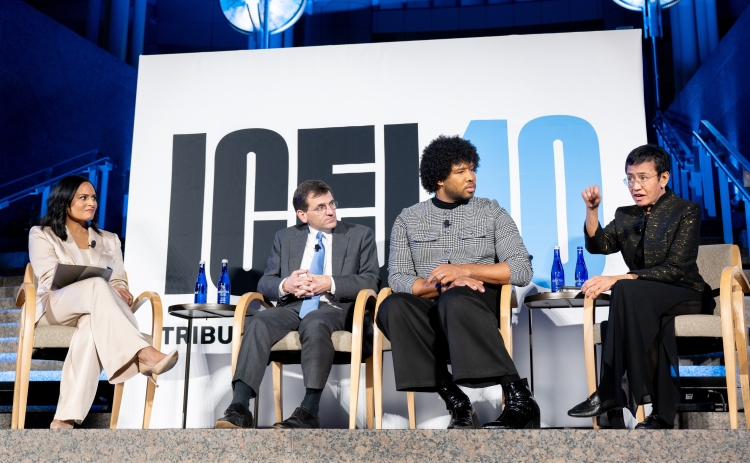The historic U.S. presidential election in November was just one of more than 70 elections in countries across the world this year, amid an ever-more chaotic environment for news.
“We’re now at the stage where every person in this room can have their own personalized reality” created by social media, said Nobel Laureate and journalist Maria Ressa. The information you receive through social algorithms is “based on what you feel, on your cognitive biases, where you’ve been nudged to a particular position.”
Ressa joined White House correspondents Peter Baker and Eugene Daniels to reflect on the challenging environment for the journalists who covered the 2024 elections and their aftermath. The panel, led by Kristen Welker, moderator of NBC News’ “Meet the Press,” was part of ICFJ’s 40th Anniversary Tribute to Journalists, held Nov. 14 in Washington, DC.
In the U.S., “we have to go back to the Civil War to find a media landscape this divided,” Welker said, referencing her interview this year with presidential historian Doris Kearns Goodwin.
In the U.S., people once agreed to the same set of facts, said Baker, chief White House correspondent for The New York Times. “Today we don’t live in that same universe,” Baker said, pointing to the stark differences between what he has heard at Trump and Harris rallies. “It’s hard to knit those realities back together again so we have a common discourse and common debate.”
Daniels said he talks “to young journalists now who, as we're going into what we know is going to be a wild four years, that they're worried that it's not going to matter.” But he said journalism is more important than ever. “Whether or not we're able to stitch it back together again, we at least all have to try,” he said.
Ressa, an ICFJ board director, first sounded the alarm about social media’s polarizing effect on electoral decision-making in 2016, after Rodrigo Duterte’s election as president of the Philippines.
“How much of our agency have we lost to a poisoned information ecosystem? And for journalists, how much of what we do gets to the ‘thinking slow’ side of the people we serve?” Ressa asked.
“[When] you say a lie a million times, it becomes a fact in our information media ecosystem. It’s the reason why you have such different realities,” she said. “The question is, ‘Do we have agency when we are being bombarded with lies?’”

Journalists are expected to face new and major challenges during a second Trump administration. Trump’s first administration was notably hostile to journalism, and he has threatened worse for his second term. In campaign speeches, Trump frequently disparaged journalists and news outlets, vowing to use presidential power to jail reporters and cancel broadcast licenses.
“Our job as reporters is not to be the opposition, which is what Trump, honestly, wants us to be because it’s easier for him if he can portray us as the opposition,” said Baker. “But it is our job, I think, to stand up in defense of truth and facts and not to pretend that something that is abnormal and has never been seen before is just more politics as usual.”
As Daniels, POLITICO’s White House correspondent and Playbook co-author, prepares to cover the new administration, he noted that foreign leaders may take their cues from Trump. “With everyone watching us, if things start to fall here, that gives a permission structure in other parts of the world to do worse things.”
“We’re all watching with bated breath,” Ressa said. “I would say for American news organizations, ‘You have to be prepared…You are at the front lines now for all of us.’”